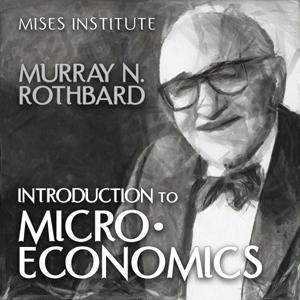Podcasts by Introduction to Microeconomics

Presented by Murray N. Rothbard in 1986 at New York Polytechnic University. Recorded by Hans-Hermann Hoppe.
Download the complete audio of this event (ZIP) here.
Further podcasts by Murray N. Rothbard
Podcast on the topic Podcasts
All episodes

11. The Structure of Production from 2010-02-12T00:00
As factors of production, supply and demand of labor, land and capital will determine how much the producer will get out of this process. This process occurs in different stages. In the earlier ...
Listen
12. Labor and Unions from 2010-02-12T00:00
In order for anyone to make ethical judgments, he must know the consequences of his various actions. In questions of union actions displacement or unemployment for oneself or others will be cons...
Listen
13. The Labor Market from 2010-02-12T00:00
Economists can say little about population and its size, despite the gloomy views of Malthus. More people are a good thing because of the division of labor. Living standards are higher when popu...
Listen
14. Interest Rates and Course Review from 2010-02-12T00:00
The time market determines the pure rate of interest. Price per unit of time may be wages or rent. The interest income will be earned by the capitalist who has assumed the task of advancing pres...
Listen
4. Price Controls in the Oil Industry from 2010-02-11T00:00
The disappearance of oil has been forecast every decade. Prices were overlooked. When the price is high it is more profitable to look for oil. Total reserves on the ground are higher than they w...
Listen
5. Minimum Price Controls from 2010-02-11T00:00
Thou shalt not sell a certain product or service below a certain price, e.g. wheat, cotton, corn, cheese, sugar. This will result in an artificial unsold permanent surplus, as it does in the Ame...
Listen
6. Government Licensing of Industry and Minimum Wage from 2010-02-11T00:00
The peanut butter crunch was in 1980. Crop acreage and production was cut down by 45% by government price support, import quotas, and cartelizing of the industry. The price of peanuts more than ...
Listen
7. Mid-Term Review and The Theory of the Firm from 2010-02-11T00:00
The objective of the corporate firm is to maximize profits and avoid losses - the same objective of the free market. But the costs are paid out before the income comes in. Stockholders will sell...
Listen
8. The Firm from 2010-02-11T00:00
Business men must make sure they can cover their costs by incoming revenue. The production function will yield a certain quantity of a product. The firm considers marginal costs and average cost...
Listen
9. Monopoly and Competition from 2010-02-11T00:00
The words monopoly and competition have been changed. Competition meant rivalry or competing, either active or potential. Businesses do not like this. Monopoly meant a grant of privilege b...
Listen
10. Government Cartels from 2010-02-11T00:00
The only cartels that have lasted have been government cartels. There is no essential difference between a cartel and an ordinary corporation or partnership. Not even the De Beers cartel is all ...
Listen
3. The Determination of Prices from 2010-01-22T00:00
Price is determined by the equilibrium price and the equilibrium quantity. If your good is not selling, you lower the price. If your goods fly off the shelves you are selling too cheaply and you...
Listen
1. Intro to Micro: Demand and Supply from 2010-01-21T00:00
Microeconomics is concerned with the actions of individuals. The focus of macroeconomics is entire sectors of the economy. All good macro will have micro foundations because those economic secto...
Listen